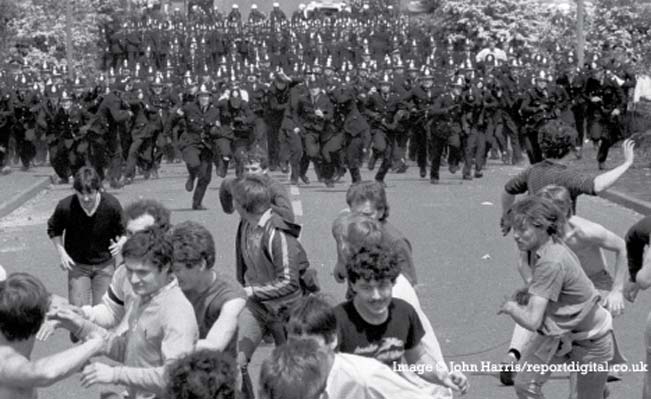
Mark Perryman welcomes the release of the Orgreave Justice Double CD of rebel music, old and new
It seems a lifetime away, that’s because it is, the launch of Rock against Racism in 1977 in the early days of Punk. The 1978 Victoria Park Festival which for those of us of a certain age was our Woodstock, politically-engaged music with a furious passion. The Clash, X-Ray Spex, TRB, mixing it up with the reggae of Steel Pulse, Misty and Roots, Aswad. A movement launched with a musical manifesto:
“We want rebel music, street music. Music that breaks down people’s fear of one another. Crisis music. Now music. Music that knows who the real enemy is. Rock against races. Love music hate racism.”
The sociologist Stuart Hall was one of those who recognised Rock against Racism’s significance “One of the timeliest and best constructed of cultural interventions, repaying serious and extended analysis.”
In the intervening years the connect between radical, oppositional politics with music and other cultural interventions was largely lost. Some have attempted a resurrection, Love Music Hate Racism in particular but with precious little of the popular purchase Rock against Racism achieved. With one singular exception, the 1984-85 Miners strike. This was twelve months of almost non-stop benefit gigs, music and comedy and the arrival of the much-missed by anybody lucky enough to see them live back then Redskins. The film Pride brilliantly depicts the kind of reach the strike produced, of solidarity.
For a while the political pop and humour the strike generated morphed into a Labour Party backed initiative ‘Red Wedge’. To be fair this was a genuine attempt at a radical model of modernisation quite different from the model for that process Blairism came to represent. When Kinnockmania proved to be not much more than a damp squib in a Sheffield arena Labour lost the ’92 Election and Red Wedge without the party behind it promptly folded. We’ve not seen much like it since.
Ian Goodyer in his book Crisis Music attempts to unpick the reasons. He sites Rock against Racism’s success between two key factors:
“the fortunate coincidence between its organisers’ ambition to build a rank and file movement against the racist poison in rock music and the arrival on the scene of a subculture- punk rock – that embodied the kind of do-it-yourself attitude that could articulate this ambition on a large scale.”
Despite the size of the Stop the War movement, particularly 2001-2003, and the Palestine demos, the two largest mass movements of the most recent period no such musical movement of a comparable size ever emerged.
Music critic Dorian Lynskey in a Guardian article following the huge student protests against tuition-fees pointed to the first revival of a music of protest. Dorian described what he was herring as not exactly ‘a scene’ but what the musicians had in common was perhaps more important, “all are fiercely articulate, well-informed and self-aware, and prefer the dedicated grassroots approach to the compromises of crossover.”
One of the key figures he interviewed was Grace Petrie, a regular at Philosophy Football’s Nights Out and last month headlined a Peoples Assembly Against Austerity benefit gig with Billy Bragg.
The beginnings of a outward-looking movement linked in to new wave protest music we can dance as well as march to? Lets hope so. In all likelihood the next five years could do with heaps more of that if the past five years are anything to go by!
What this might look like is represented by the recently-released double CD Orgreave Justice. A stellar line up, some familiar, some not, featuring Matt Abbott, Attila the Stockbroker, Banner Theatre, Billy Bragg, The Black Lamps, Blaggers ITA, Blossoms, Cambodia, Chris Evans Collective, Chris T-T, Chumbawamba, Steve Drewett, Paul Heaton, The Hurriers, Jethro Platts, Joe Solo, Robb Johnson, Jon Langford, Louise Distras, The Movement, New Model Army, The Oppressed, Grace Petrie, Pitman Poet, Quiet Loner, Sleaford Mods, TV Smith, Terry and Dead, Thee Concerned Citizens, Thee Faction, Tony Walsh, Steve White and the Protest Family and Wilde Sammon.
Many had come together for a 30th Anniversary Orgreave benefit last June funded by Philosophy Football and organised by socialist r&b band Thee Faction. A little under a year later their, and others’ music are on the double CD. Put together by Barnsley band The Hurriers, who have printed on their calling cards ‘ a proper socialist band like every town needs’. Too right, again its too early to suggest anything resembling a ‘scene’, but initiatives such as Glossop’s The Defiance Sessions or the 22 April General Election gig at London’s 100 Club and Attila the Stockbroker’s well-established Glastonwick festival all suggest there is the beginnings of a new wave of protest movement taking shape.
Outside of both the musical and the political mainstream. Challenging the latter, dragging the forward march leftwards, requires some kind of counter-culture, it was ever thus, that at least has never changed. From Sleaford Mods, Bragg and Petrie via New Model Army, Paul Heaton and Louise Distras to Robb Johnson, Chris T-T and Joe Solo, there’s a soundtrack of change here no self-respecting politics of hope can afford to be without.

